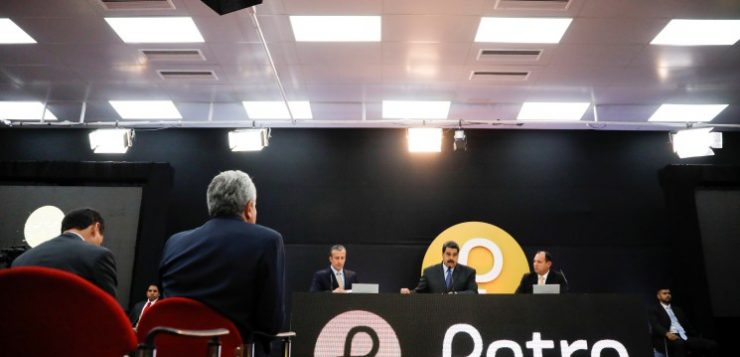Venezuela is in the midst of one of the largest economic disasters in recent history. Rampant inflation over 4000 percent in the past year, food and medical shortages, and political turmoil have left the country in a perilous state. In the midst of this crisis, the government has proclaimed its new cryptocurrency, the petro, as a digital alternative to their now close-to-worthless physical currency, the bolívar. Cryptocurrency values have been characteristically volatile this past year, so the idea that the petro can ameliorate an economic crisis rooted in the bolívar’s volatility seems unbelievable.
Yet, Venezuelan President Nicolas Maduro claimed the country raised $735 million in its first-day presale of the petro and seeks to raise around $6 billion dollars in total from foreign investors. Following Venezuela’s asserted success with circumventing sanctions through a successful petro pre-sale, countries like Russia, Turkey, and Iran are looking into developing their own national cryptocurrencies as well.
The appeal of cryptocurrency adoption over the past decade stems from its underlying technology. The transfer of cryptocurrencies takes place via the blockchain, a public ledger that digitally records the transactions between two parties. A key feature of the blockchain is its decentralization – all nodes in the network verify and encrypt transactions to maintain the integrity and security of the network. Because all nodes share this task equally, cryptocurrency transactions can take place without the need for a central oversight.
The petro differs significantly from other popular cryptocurrencies like Bitcoin, Dashcoin, and Litecoin that circulate widely. The price of one petro is pegged to the price of one barrel of Venezuelan oil – claimed by Maduro to be about $60 as of this writing. In contrast, a cryptocurrency like Bitcoin’s price fluctuates based on demand. Additionally, the petro/bolivar exchange rate, as explained in the petro whitepaper, includes a discount factor determined by the Venezuelan government. Rather than avoid centralized control over the market, the petro is subject to arbitrary discount factor adjustment, fluctuating oil prices, and a corrupt government known for manipulating its currency. There exists a very real danger that the petro will not only fail to cure Venezuela’s economic woes but will also weaken the integrity of cryptocurrencies writ-large.
Circumventing sanctions
Foreign investors exclusively funded the presale; this rapid influx of capital could not have occurred by conventional means as Venezuela is subject to international sanctions. Because the government only accepts euros, dollars, Bitcoin, or Ethereum in exchange for petros, but has banned the circulation of foreign currencies, Venezuelan citizens cannot purchase the petro. Consequently, Venezuelans experiencing the brunt of economic instability will see no relief from the cryptocurrency. Although creative, it is relatively unsurprising that a dictatorship with little reserve currency, debts it has already defaulted on, and over $60 billion in debt to foreign creditors has resorted to a deceitful means like introducing the petro.
It is unclear what (if any) use the petro has for foreign speculators. The petro whitepaper limits its use to Venezuelan citizens for the payments of taxes, fees, and public services. Though the petro’s price is pegged to the price of oil, one cannot exchange a petro for a barrel of oil. By taking advantage of the speculator hype that accompanies “blockchain” as a buzzword, the Venezuelan government has managed to circumvent sanctions by accumulating foreign currency without fixing its country’s underlying economic volatility.
The petro cannot stabilize the Venezuelan economy and instead exists to create foreign currency reserves from thin air. As Turkey, Iran, Russia, and other sanctioned countries deal with their severe economic impacts, they might pursue the same fraudulent strategy as Venezuela: create a cryptocurrency tied to a government-controlled asset, raise money in violation of sanctions, and proceed to manipulate that cryptocurrency’s value to maximize profit.
A Dangerous Example
Venezuela sets a dangerous example with the petro. Developers of legitimate cryptocurrencies prioritize decentralized, secure, and transparent transactions. Instead, this cryptocurrency presale provides no real service for its international holders, and the worst is still yet to come. The Venezuelan government has announced plans to release a second cryptocurrency linked to gold, which will no doubt be just as worthless as the petro.
Although Venezuela was able to raise money in its pre-sale, speculators will quickly find the petro has no long-term value. Such realization and its aftermath may unfortunately contribute to the idea that cryptocurrencies facilitate fraud. Just as concerning, the power of sanctions is in danger of eroding – other countries may feel emboldened to act more aggressively if economic sanctions can be thwarted through cryptocurrency sales. A hard line must be drawn on the development of empty cryptocurrencies that are ultimately a form of national illicit debt relief, or else serious and legitimate adoption of cryptocurrencies will be seriously stifled.
Read more at:
www.brookings.edu







